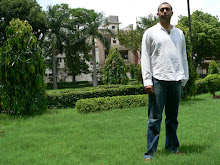The remarkable Congress victory in India's elections is as dramatic a result as the mandate Sonia Gandhi managed five years ago. The Congress has got more than 200 seats, the best showing for 18 years. The 2009 election marks the end of the rise of the smaller, regional parties and the broadening of the voters' viewpoint. It sees the Left chastened. The Hindu nationalist BJP is already introspecting about the fact the party and its core ideology repels Muslims.
But let's make this personal. Post-independent Indian history of the post Gandhi family age will remember one towering figure: Manmohan Singh. I was one who did think it was wrong not to have an elected but selected PM like Dr Singh. But these historical quirks aside Dr Singh will if he can take steps to rescue the faltering economy and right the growth path be compared to Deng Xiaoping in years to come.
Like Deng, Dr Singh was an outsider. He saw the chaos of partition, crossing over as a poor boy on foot from Pakistan. Congress' Indian nationalism was an easy option over the sulphuric odours of the Sangh. But not for him the sycophancy of Congress apparatchiks or the genuflections of Gandhi family courtiers.
Instead he viewed India's problems through the lens of an academics' chesma, coming to the conclusion as a young economist that India's Nehruvian autarky was a one way ride to economic ruin. He was right.
Singh spent a great deal of his life working to undo the effects of this debilitating mindset as a bureaucrat. By all accounts he displayed a ruthless intellectualism, a quality that usually marks the end of a political careers not the making of one. But favoured by perhaps the wiliest Indian politician of the last sixty years, Narasimha Rao, Singh grew in stature. It is a tribute to Singh that he could balance his friendship with Rao and the Gandhis, who loathed Rao's slippery politics.
Perhaps Singh's most impressive quality is that his thinking is deeply ingrained with the idea that when reform from the top becomes impossible, revolution from the bottom becomes inevitable. He understands that people of privilege will risk destruction rather than surrender any material part of their advantage. The rich think their privileges are a God-given right. Singh has tried to undermine this in a quietly determined way.
His government has not relented from telling corporate bosses not to indulge in vulgar displays of conspicuous consumption and pushing forward with the Bismarkian employment schemes for the poor. He's given millions of Indian government employees pay increases. He calls caste, a pernicious hierarchy, a version of apartheid.
In terms of political acts Singh's decision to jettison as Finance Minister in 1991 decades of Indian economic thinking about self-sufficiency and embrace an import-friendly regime will be recalled as important as Deng's conversion to capitalism. Singh's been PM for five years, he'll probably see out the next five paving the way for another reformer to take over. Let me make one prediction: Singh's revolution will be only complete when a truly competent successor takes over. This means Rahul Gandhi - may like his mother - campaign, win and then step aside for a better man or woman to be PM.
Sunday, May 17, 2009
Subscribe to:
Post Comments (Atom)

1 comment:
Perhaps Singh's most impressive quality is that his thinking is deeply ingrained with the idea that when reform from the top becomes impossible, revolution from the
bottom becomes inevitable
-----------------------
Certainly, and well-noted, that change in India cannot come from the defunct post-perhaps-neo-colonial system of adminstration most ably delinated in Potters' ' India's Political Adminstrators'.
It is good that we can see through such. Now the real work begins - that of creating a sustainable institutional structure based on developmental needs. It is a big job.
Post a Comment